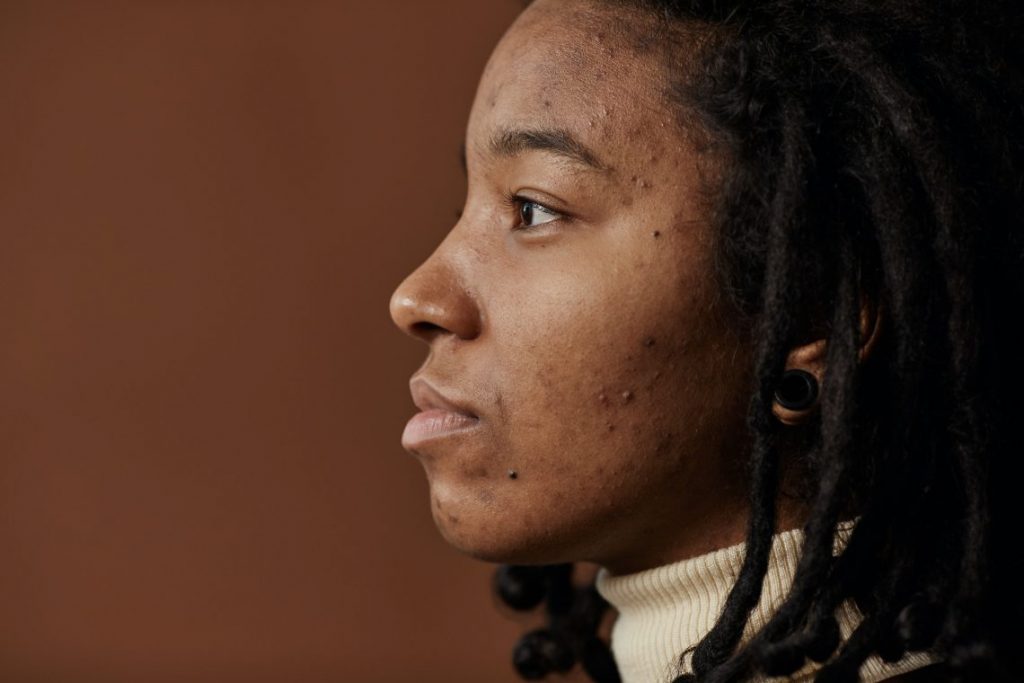
Source: American Academy of Dermatology Association
Which of the following is FALSE:
- Use skin care products that say “alcohol free” on the label
- Shampoo often if you have oily hair and forehead acne
- Scrubbing your skin will help acne clear more quickly
- Wash your face up to twice daily and after sweating
Scrubbing your skin can irritate your skin and actually worsen acne.
What should you avoid doing when treating acne?
- Trying new treatments often if they don’t work after a few days
- Treating early when pimples are mild
- Applying medication over all acne-prone skin
- Keeping your skin moisturized
Give an acne treatment time to work. You want to use a product for 6 to 8 weeks. It takes that long to see some improvement. If you don’t see any improvement by then, you can try another product.
True or False – Changing your sheets and pillowcases at least once a week can help clear acne.
- TRUE
- FALSE
You want to change your sheets at least weekly to prevent new acne breakouts. By the end of one week, sheets and pillowcases are swarming with dead skin cells and bacteria. These can clog your pores, leading to breakouts.
What does NOT happen when you pop or squeeze breakouts?
- You push the pus, dead skin cells, or bacteria deeper
- You increase inflammation
- You have a higher risk of scarring
- You clear the breakout more quickly
True or False – Drying out the skin helps acne.
- TRUE
- FALSE
Skin with acne is oily, so it can be tempting to apply astringent and acne treatments until your face feels dry. Don’t. Dry skin is irritated skin. Anytime you irritate your skin, you risk getting more acne.
What to do instead: Use acne treatments as directed. If your skin feels dry, apply a moisturizer made for acne-prone skin. You’ll want to apply the moisturizer twice a day, after washing your face. You also want to avoid using astringents, rubbing alcohol, and anything else that can dry out your skin.
True or False – Blackheads appear when your pores get clogged with dirt.
- TRUE
- FALSE
Dirt doesn’t cause blackheads. You see a blackhead when a pore becomes clogged with excess oil, dead skin cells, and bacteria. The black color appears because air mixes with what’s clogging your pores—similar to when a cut apple turns brown.
Acne can cause which of the following?
- Scars
- Dark spots on the skin
- Low self-esteem
- All of the above
Some people dismiss acne as a skin condition that you’ll eventually outgrow, but it can have a profound and lasting effect on someone’s life. This is why dermatologists recommend treating acne.
Does tanning help clear acne?
- Yes
- No
If you tan, you’ll still have acne. Tanning also damages your skin. Research shows that when UV light from the sun or a tanning bed hits your skin, it increases your risk of developing melanoma (the most-serious skin cancer) and other skin cancers.
How do you apply acne treatment?
- By applying only on your blemishes
- By thickly layering the medication for more effectiveness
- By applying over all areas of acne-prone
- By putting on enough to dry your skin
For best results, you want to apply a thin layer of the medicine to the entire area not just your acne. This prevents new blemishes from forming.
True or False – You should wash your face throughout the day.
- TRUE
- FALSE
Washing your face several times a day can further irritate your skin, leading to more breakouts.
What to do instead: Wash your face twice a day — when you wake up and before you go to bed. You’ll also want to wash your face when you finish an activity that makes you sweat.
How do you avoid worsening acne when exercising?
- Scrubbing your face with a towel during the workout
- Wearing tight clothes
- Showering ASAP after working out
- All of the above
Wear loose-fitting workout clothes made of cotton or sweat-wicking fabric.
What should you look for on labels of makeup products that won’t worsen acne?
- Oil free
- Non-comedogenic
- Won’t clog pores
- All of the above
Although some makeup can clog pores and cause breakouts, you can wear makeup if you choose it carefully.
